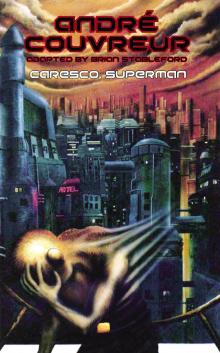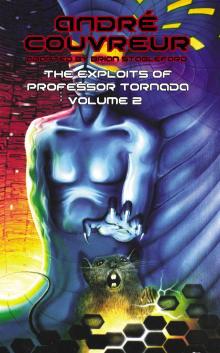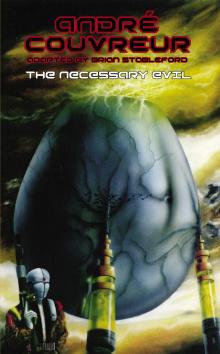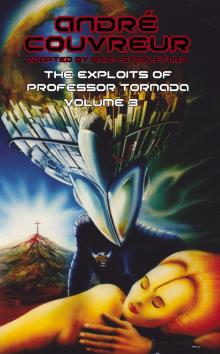- Home
- André Couvreur
The Exploits of Professor Tornada (Vol. 3) Page 7
The Exploits of Professor Tornada (Vol. 3) Read online
Page 7
In the background, equally rebarbative in appearance, were the commons of the animal acclimation, then those of energy production, and then those of the administration. The latter were directly adjacent to the exterior. Thus, in this domain, where the profane only sojourned under complete anesthesia, everything was disposed in order to guard the secrecy of what was done therein.
The visitors headed for the first building. A chimpanzee was on duty at the door; he wore the uniform of his fellows, a white two-piece, tightly fitted to the entire body, which, apart from ensuring propriety, also made sure that its possessor did not depart from the human stance required of members of his species. Perceiving his masters, he yelped with pleasure, and then turned on the electricity by means of a commutator, like the most well-trained of warders.
The light illuminated a vast dormitory, disposed in three ranks of oblong boxes opening on to a central aisle furrowed by the railway track. Each of those cells, about two meters deep, contained a kind of metallic diving-suit, in which Tornada’s subjects lay, before as well as after their operations. Enveloped with bandages from head to toe, alimented with sterilized air by means of conduits connected to a longitudinal array of tubes, they were reminiscent of mummies waiting to rebound into life.
At the far end, the installation of several of the patients operated on that morning was just being completed. Their diving-suits, brought back from the operating theater on small wagons, were lifted up by a crane hanging down from the vault, and then collected by a team of chimpanzees, who slid them into vacant boxes. Bodies that had completed their renovative stage were re-expedited to the administrative quarters, where they were taken out of their sheaths, woken up, bathed, fed, dressed and sent on their way without any protocol of farewell. Of all that fantastic carnal upheaval, nothing remained, in the depths of the diving-suit, but a few waste products of the operation: hairs and the dust of scars, which were immediately subjected to sterilization in order that the apparatus could be used by others. Everything functioned simply and automatically, with the aid of energy obedient to the manipulation of a switchboard, reducing manual work to a minimum.
“Going smoothly,” Tornada approved. “But would it go as smoothly if I entrusted the work to humans? Would they have the delicacy, the dutifulness, the precaution and the method of my present aides? Dear beloved quadrumanes, whom I have made into bipeds, how I shall probably miss you!”
He stroked the muzzle of a she-ape with his hairy hand. “This one, Fifi, is my favorite. She’s skillful and sensitive. It’s true that I’ve swapped her cerebellum for that of a nun, for whom it was superfluous. Unfortunately, I also stole her right kidney for the benefit of a Commodore fatigued by whisky. And to think that tomorrow, I’ll be obliged to dispossess her of her stomach in favor of von Vixtiel, the German chancellor, who belches when making speeches in the Reichstag. Poor darling, what will be left of her? Tell me my friends, am I not very guilty in heaping our race with that respectable eucrasia?”
They went on, traversing the other six similar rectangles fitted out as dormitories, all full. Before entering the last one, however, Tornada became irritated, his hands quivering with tics. Sitting down, with this head between his legs, the orangutan on guard was asleep.
“Just you wait!”
From a pendant suspended around his neck he extracted three whistle-blasts. Comrades armed with things arrived, bounding, Tornada only had to point at the sleeper. They understood, laid his buttocks bare and flagellated him conscientiously. The guilty party accepted his punishment stoically, while gazing sadly at the torturers and the administrator of justice.
“The whip—that’s the secret of virtue! But the human rabble protests...”
They went into the Acclimation Section. The apes’ lodgings were formed by two hexagons, with huts disseminated in trees, externally primitive but provided with ultra-modern comfort inside. The races were not mingled: the chimpanzees were in one hexagon, the orangutans in the other. In each phalanstery, however, marriage associated individuals with a view to intensive reproduction, in order to supply surgical needs, and a crèche supervised by a she-ape gathered the newborns together; a partly-chemical alimentary regime fortified them. It was bath-time, and Mélanie convinced herself yet again that she did not care for her own children any more tenderly.
Then they visited the Piggery, divided into small sties, each with its own bathing-pool. Pigs, Tornada remarked, only owed their ignominy to the negligence of humans. They were exquisitely clean here, as pink as could be, their litter neat and tidy, without a stain, and they were joyful, for the most part, to wallow in water that was cold in summer and warm in winter. In accordance with necessity, the chimpanzees who looked after them led them to the vivisection room adjacent to the operating theater. There, Dr. Tréfond, Tornada’s only assistant, stripped them of the regions that were needed for humans, stitched them up and sent them back for further fattening—after which Lapastille sold them in batches.
The apes appointed as the pigs’ guards, who assisted in the dispossession of their organs, knew full well that a similar fate awaited them, but, as the innocence of those practices and the abolition of suffering were not unknown to them either, they lent themselves to it with more resignation than the slaves once fed to moray eels and the Christians to lions by the ferocious civilized Romans.
The buildings of the Vivisection not being far away from the Apery and the Piggery, Tornada and the Lapastilles continued their tour of inspection there. They found a dozen pigs and as many chimpanzees and oranges giving birth to those of their organs which were to be transplanted later that day. Dr. Tréfond had butchered them with that objective during artificial slumber, Tornada admitting even less suffering among animals than among humans.
Still asleep, arranged by category on marble tables, they scarcely inspired more horror, in spite of their open bellies, chests or skulls, than a butcher’s stall; in any case, some of the had already been sown up, with the pieces that had just been removed from them in limpid bottles beside them.
The trio then visited the kitchens, where nourishment was prepared artificially; then the machine room, where the immense apparatus producing power was working in silence; then they went to the outbuildings: the commons, the workshops and the garages, in which vehicles were stationed that were never used, a veritable fortune—all of it carefully isolated by high walls in order that no communication was possible between the external manual labor and the rest of the surgical exploitation.
“It’s perfect,” Tornada rejoiced. “Nothing to say! Everything’s proceeding marvelously. Let’s now wait for it to break down in the hands of the sons of Adam and the daughters of Eve. Tell me, old Phraste, when you hire these nurses, will you bring up the question of the whip?”
“I won’t take responsibility for that, old Nada. Who’s going to strike them?”
“The chimpanzees, of course…it’s certainly their turn.”
“I’ll leave you,” said Mélanie, who was eager to get back to her nest.
Tornada kissed her on the cheek—after which, followed by his general administrator, he sat astride a wagon that was making its way through the park, heading for the technical services. They went past a crew of orangutans carrying urns full of chemical compounds. In general, the orangutans were given the most vulgar tasks. Then they passed two chimpanzees leading a pig, and then another that was operating the points on the rack.
At that level there was a convoy of diving-suits, already positioned for the operations that evening and night, but the surgeon despaired of counting them. Immediately revived by the hope of a more delicate surgery, however: eyes, an aorta or a pneumogastric substitution—how the hunter seeks his prey!—he jumped off his vehicle and ran to operate the secret lock of the armored door that gave access to his operatory fortress.
Immediately illuminated, a huge gallery appeared, with a long platform running alongside the track, and branches that ended in the operating theaters, three vast rotundas i
n thick glass. Chimpanzees were just finishing the cleaning, projecting jets of sterilizing steam collected from a system of tubes on to the tiled floor, the glass walls and the operating bed. Others were carrying complicated, grim metallic instruments, reminiscent of hands, to the sterilizer. Yet others were arranging bottles in glass cases, in which were floating the pieces extracted during operations, or those of animal provenance, which were shortly to be used.
Tornada picked up one of those receptacles as he passed by and considered it through the transparency. “Look, this is the brain of the poet Raoul Verdier.13 Beauty, sonority and rhythm have emerged from that piece of meat, to make young women swoon! Until the day when a little artery burst. Pop! No more music! Senility! Then, quick, off to good old Tornada!” He replaced the item. “To Tornada, who endowed him with the encephalum of a she-ape. We’ll see what he can sing now. Oh, the soul…the soul at the mercy of a weakening artery...”
In one corner, however, a man was working separately. It was Dr. Tréfond, the ultimate in discretion. Clad, like the animal population, in a white two-piece, he would have seemed, with his side-whiskers, his prominent muzzle and his reinforced abdomen, as apelike as the apes if his gold-rimmed spectacles had not differentiated him. A poor jetsam of the medical profession, picked up by the Renovator, he lent obscure assistance to his interventions. His job included the preparation of the anatomical components. Tornada felt great pity for him, but was careful not to let it show. He treated him more wretchedly than his other animal assistants.
Tornada went over to him and brutally snatched away the quivering specimen that he was labeling with a number. By means of gestures, he expressed his discontent with work that was, however, conscientious. The other uttered a guttural exclamation, his form of protest. Then Tornada threw the substance in his face.
“The whip!”
The heat was becoming stifling; the surgeon and his companion hastened to pass through the other two rotundas. They came out into an atrium in which there was another low door, armored with iron. Behind it was the laboratory into which the scientist never allowed anyone to accompany him. There, under the action of powerful physical agents, microbial cultures were elaborating the atomic associations constituting the famous serum, one drop of which restored life and reanimated youth.
This time—a rare favor—the sorcerer was about to take Théophraste into it, but he consulted his watch.
“Three o’clock already! The consultation...another time.”
In order to reach the consultation building, a dependency of the administration, they installed themselves in a wheeled vehicle that was reserved for them, and moved along a track that was similarly reserved. They went with the rapidity of an express train to the only building that had an external façade.
What hope, confidence, certainty, impatience, admiration palpitated in the hearts of the crowd queued up outside the door, extending for a great distance along the boulevard; and what envy too, directed at the privileged who, furnished with an order number, went through the barriers under police escort! Tornada and Lapastille had long accustomed their ears to hearing hosannas and imprecations.
There were only two rooms, as pragmatically summary as the rest of the domain: a waiting room with benches, and a large study with a desk and chairs. In the former were stationed numerous old people, exhausted individuals, invalids on stretchers mounted on wheeled fames. Their dull eyes had rediscovered the mystic flame that had been illuminated not long before by a celebrated water-cure: an evolution of faith inspired, after God, by a man...
Tornada sat down before a heap of letters: implorations of mercy from all over the world. They no longer tickled his pride. He pushed them aside. “You read them. I don’t have time, and it’s your job. Start sending them in now—at the trot.”
Having donned a white clinical smock like his master, the painter went to open the door, taking a megaphone.
“The consultation is commencing!”
A hundred arms reached out toward him.
A dark-skinned, skirted and turbaned Hindu ran forward. He was bringing, with an escort of twenty automobiles, the ostentatious Rajah of Travancore. “Number…one...” he stammered.
“The poor first. Wait.”
An entire limping troop of old people, sent from a hospice in the Nord, followed an alert guide who arranged them in front of Tornada’s study. They each had a medical file describing the infirmities, intoxications and organic deficiencies to be combated in order to restore them to health.
Tornada merely scanned the diagnostics. Banal work.
“Agreed…you’ll be taken in, you load of drunkards. In a week, you’ll be able to go back to the mines. But the booze is prohibited from now on. I’m going to infiltrate you with a disgust for alcohol. And as a viaticum...” He turned to Lapastille. “Check for twenty thousand each.”
Weeping, one old man hurled himself at his benefactor’s feet and seized the hem of his sleeve in order to kiss it. Tornada kicked him away.
“Go away! Next!”
The social scum filed past: three clients from night-shelters, a female mandolin-player from the taverns, a bunch of English road-sweepers, a beadle from Perpignan, a dozen retirees from the Invalides, a public convenience attendant and a group from the Far West. All undermined by age and poverty, they started exposing their diseases and their injuries, and their desire to go on living. Tornada ordered them to be silent, examined them summarily, dictated technical terms to Lapastille, admitting them for six days, assured them of a check and spurned their gratitude.
“Get out! Next! At the trot!”
That was the Rajah. He was introduced on a golden palanquin carried by two Hindus. He was at the extreme limit of decrepitude, deaf, blind, completely toothless, his entire body shaking with an irreducible tremor. Nothing was respectable but his white beard, the rival of Tornada’s. His assistant explained, not without difficulty, that for dynastic reasons, it was necessary to prolong that carcass. The country needed sons, and the Rajah had never produced anything but daughters.
“Yes, young ape, it’s possible; it’s just a matter of fixing a price. I have expenses. How much, General Administrator, should we charge this trinket-wearer?”
“My word...twenty million…” Lapastille hazarded.
“Let’s make it thirty and say no more.”
The surgeon’s formidable pretentions were well known. It was also well known that he was a kind of equilibrating regulator of worldly wealth and poverty, returning his profits to the poor. The “young ape” accepted without blinking.
“I’ll operate on him at three o’clock in the morning.”
The palanquin was succeeded by a wheeled armchair, transshipping a no less lamentable ruin, paralyzed down one side, his eyes congested and bulging, his lip slack. It was Van der Flick, famous on the far side of the Atlantic for the trusts in everything that he bought and sold. Tornado immediately diagnosed a cerebral hemorrhage on the right, for he could still talk while drooling.
“I…am...very…distem…pered…Doctor...”
“Yes. Hang on to your saliva. I can see what’s wrong.”
“How much is it?” demanded the showman who was accompanying him.”
“It’s fifty million, at the current exchange rate. I’m a generous fellow.”
The showman started. Tornada swelled up.
“What, Monsieur, this is a citizen of the U.S.A., a member of the Billionaires’ Club, and you’re hesitating! I’m giving him life, Monsieur! He’ll be able to swill more cocktails! He’ll die of his cocktails…and you’re being niggardly! One doesn’t haggle over my prices, Monsieur. That will be a hundred million. Write a hundred million, General Administrator. Good evening, Van der Flick.”
He was taken away. Others succeeded him. None promised a delicate intervention. They were all cases of a disheartening banality. Lapastille was now regulating the material questions, graduating the tariff in accordance with the fortune.
Chapter VI
<
br /> In the turquoise blue frame of her boudoir, in front of her Louis XV dressing-table with the feet overladen with amours, Madame Marcel Granive was completing her make-up. It is an exceedingly delicate work of art to endow a forty-year old face with the brightness of twenty, but she succeeded, and her daily care had ensured that she had not yet been bitten by a single wrinkle.
She had reached the most exciting part of her labor—the reconstitution of the eyebrows, shaved and then painted back on, Japanese-style, in accordance with current fashion—when she saw in her mirror the lace curtain that isolated the boudoir from her bedroom open to admit her husband.
Swiftly, she pushed her apparatus away. “Well?”
“He refuses!”
That news creased her features, restoring her real age at a stroke. The refusal of Wysnauer, the banker, to postpone the settlement of the two million that he had advanced them, at a usurious rate of interest, to fund the running of the biological factory, was a disaster. The bankruptcy of Serum vitalisans, in the wake of Tornada’s discoveries, was therefore going to be complicated by the ruination of the other products manufactured by the same firm.
Wysnauer was demanding his due; they would be obliged to shut down the laboratory, for lack of money to pay the collaborators and manual workers. Then it would be adieu town house, adieu luxury, adieu the mirages of society and all her proud conquests in her husband’s wake; then economies, restriction, perhaps poverty. She would be cast aside as she had cast aside friends stricken by the same fate. And her mirror revealed to her at that moment that she would no longer have the resource of going back to her old career.

 Caresco, Superman
Caresco, Superman The Exploits of Professor Tornada (Vol. 2)
The Exploits of Professor Tornada (Vol. 2) The Necessary Evil
The Necessary Evil The Exploits of Professor Tornada (Vol. 3)
The Exploits of Professor Tornada (Vol. 3)